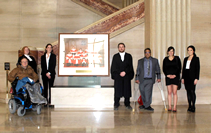Act Now

Empower U: Learn to Access Your Disability Rights Training on Canadian Human Rights, the Convention on the Rights of Persons with Disabilities (CRPD) and its Optional Protocol (OP) training aims to increase awareness of how to address discrimination using more familiar Canadian human rights laws such as Human Rights Codes and the newer international Convention on the Rights of Persons with Disabilities (CRPD). This is training for persons with disabilities by persons with disabilities. The training is part of a project funded by Employment and Social Development Canada and implemented by the Council of Canadians with Disabilities (CCD) in collaboration with Canadian Multicultural Disability Centre Inc. (CMDCI), Citizens With Disabilities – Ontario (CWDO), Manitoba League of Persons with Disabilities (MLPD) and National Educational Association of Disabled Students (NEADS). Read more.
Sign Up for our monthly digest
A monthly newsletter from CCD about what is happening in the community
Council of Canadians with Disabilities to Intervene at Supreme Court of Canada Hearing Regarding Access to Justice for Victims of Discrimination
Related Documents
June 23, 2022
Supreme Court of Canada Rules Charter Challenge to Forced Psychiatric Treatment Laws Can Continue
November 24, 2021
Immediate and Meaningful Action Required to Address Systemic Discrimination of Adults Who Have a Disability in Nova Scotia
October 6, 2021
SIGNIFICANT VICTORY FOR NOVA SCOTIANS WITH INTELLECTUAL DISABILITIES
For immediate release
December 10, 2010
(Winnipeg, Manitoba – December 10, 2010) – The Council of Canadians with Disabilities, a national human rights organization, will be appearing before the Supreme Court of Canada in Mowat v. Canada (Attorney General), an appeal about access to justice for victims of discrimination. The CCD was granted leave to make written and oral arguments in this matter.
This case involves a woman, Ms. Donna Mowat, who filed a human rights complaint after she experienced sexual harassment at work. According to the Federal Court of Appeal, Ms. Mowat, whose sexual harassment complaint was largely successful, was entitled to only $4000 in compensation, although her legal fees to bring her complaint forward were nearly $200,000.
In this appeal, the Supreme Court will be asked to decide if those who experience discrimination should be reimbursed for their legal costs relating to filing human rights complaints. According to David Baker, counsel for the CCD in this matter “Very often, the legal fees to file complaints and to have them heard by the Canadian Human Rights Tribunal are more than what is awarded as compensation to successful complainants. As a result of this, even when victims of discrimination win their cases, they are very often out of pocket several thousands of dollars.”
The CCD will argue that the human rights legislation must be accessible to people who experience discrimination. This is particularly important for people with disabilities who represent the largest proportion of complainants before the Canadian Human Rights Commission.
“People with disabilities rely on the human rights legislation to challenge systemic barriers faced by all people with disabilities in housing, employment and services. Without compensation for legal costs, the CCD would not have been able to challenge VIA Rail’s purchase of inaccessible cars,” says Laurie Beachell, of the CCD. “More recently, Peter Hughes’ successful human rights complaint against Elections Canada led to significant changes in polling stations during elections.”
The appeal will be heard Monday, December 13, 2010 at 10:00 a.m. at the Supreme Court of Canada in Ottawa. The CCD will be represented by David Baker, of bakerlaw and Paul Champ, of Champ and Associates.
-30-
MEDIA CONTACTS
David Baker, Counsel to the Council of Canadians with Disabilities
bakerlaw
416-533-0040
dbaker@bakerlaw.ca
Laurie Beachell, National Co-ordinator
CCD
204-947-0303
laurie@ccdonline.ca

Some members of the CCD team at the Supreme Court of Canada on April 25, 2018 to intervene in S.A. v. Metro Vancouver Housing Corporation. (L. to R. Bob Brown, CCD Human Rights Committee member, Dianne Wintermute, legal counsel (ARCH), Dahlia James, a second year JD candidate at U. of Ottawa and Prof. Ravi Malhotra’s Research Assistant and Luke Reid, legal counsel (ARCH) , and Prof. Ravi Malhotra, a member of the Human Rights Committee, Prof. Anne Levesque, Chair of the Human Rights Committee, and Erin Carr, a second year JD candidate.
The Latimer Case
The Latimer case directly concerned the rights of persons with disabilities. Mr. Latimer's view was that a parent has the right to kill a child with a disability if that parent decides the child's quality of life no longer warrants its continuation. CCD explained to the court and to the public how that view threatens the lives of people with disabilities and is deeply offensive to fundamental constitutional values. Learn more.
